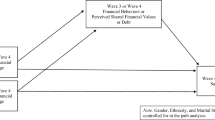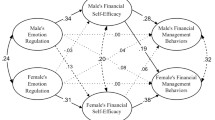Abstract
This study examined whether financial behaviors mediate the association between financial selfefficacy and romantic relationship flourishing. Previous research and Family Financial Socialization Theory suggest that financial behaviors may benefit romantic relationship outcomes in emerging adulthood. Previous research also suggests that financial self-efficacy may benefit romantic relationship quality in emerging adulthood. Research has yet to document, however, whether financial self-efficacy may indirectly benefit romantic relationship outcomes through financial behaviors in emerging adulthood. Using data from the Measuring Family Financial Socialization Project (N = 1,950 emerging adults), we used structural equation modeling (SEM) to examine whether financial behaviors mediate the association between financial self-efficacy and romantic relationship flourishing. We found that financial self-efficacy was positively and indirectly associated with romantic relationship flourishing, with financial behaviors fully mediating the relationship. In addition to helping emerging adult couples with their financial behaviors, relational educators and clinicians may consider intervening in emerging adult couples’ financial self-efficacy as an indirect relational treatment. Financial educators and parents might help children, adolescents, and emerging adults build financial self-efficacy to benefit not only their future financial wellbeing but also their future relational wellbeing.

Similar content being viewed by others
References
APLUS. (2009). https://www.aplushappiness.org/reports
Arnett, J. J. (2000). Emerging adulthood: A theory of development from the late teens through the twenties. American Psychologist, 55(5), 469–480. https://doi.org/10.1037//0003066X.55.5.469
Arnett, J. J. (2014). Emerging adulthood: The winding road from the late teens through the twenties. Oxford University Press. https://doi.org/10.1093/acprof:oso/9780199929382.001.0001
Arnett, J. J., Žukauskienė, R., & Sugimura, K. (2014). The new life stage of emerging adulthood at ages 18–29 years: Implications for mental health. The Lancet Psychiatry, 1(7), 569–576. https://doi.org/10.1016/s2215-0366(14)00080-7
Asebedo, S., & Payne, P. (2018). Market volatility and financial satisfaction: The role of financial self-efficacy. Journal of Behavioral Finances, 20(1), 42–52. https://doi.org/10.1080/15427560.2018.1434655
Bandura, A. (1997). Self-efficacy: the exercise of control.
Bandura, A. (1986). The explanatory and predictive scope of self-efficacy theory. Journal of Social and Clinical Psychology. https://doi.org/10.1521/jscp.1986.4.3.359
Bartholomae, S., & Fox, J. J. (2021). A decade review of research on college student financial behavior and well-being. Journal of Family and Economic Issues, 42(1), 154–177. https://doi.org/10.1007/s10834-021-09756-6
Britt, S., Grable, J. E., Nelson-Goff, B. S., & White, M. (2008). The influence of perceived spending behaviors on relationship satisfaction. Journal of Financial Counseling and Planning, 19(1), 31.
Cohen, J. (1988). Statistical power analysis for the behavioral sciences. Erlbaum.
Comrey, A. L., & Lee, H. (1992). A first course in factor analysis. Erlbaum.
Curran, M. A., Parrott, E., Ahn, S. Y., Serido, J., & Shim, S. (2018). Young adults’ life outcomes and well-being: Perceived financial socialization from parents, the romantic partner, and young adults’ own financial behaviors. Journal of Family & Economic Issues, 39(3), 445–456. https://doi.org/10.1007/s10834-018-9572-9
Dew, J., Britt, S., & Huston, S. (2012). Examining the relationship between financial issues and divorce. Family Relations, 61(4), 615–628. https://doi.org/10.1111/j.1741.3729.2012.00715.x
Dew, J., Dean, L., Duncan, S. F., & Britt, L. S. (2020). A review of effectiveness evidence in the financial-helping fields. Family Relations, 69(3), 614–627. https://doi.org/10.1111/fare.12445
Dew, J. P., Trujillo, S., & Saxey, M. T. (2022). Predicting marital financial deception in a national sample: A person-centered approach. Family Relations, 71(4), 1497–1514. https://doi.org/10.1111/fare.12654
Dew, J. P., & Xiao, J. J. (2011). The financial management behavior scale: Development and validation. Journal of Financial Counseling and Planning, 22(1), 43–59.
Dew, J. P., & Xiao, J. J. (2013). Financial declines, financial behaviors, and relationship satisfaction during the recession. Journal of Financial Therapy, 4(1), 1–20. https://doi.org/10.4148/jft.v4i1.1723
Dew, J., & Yorgason, J. (2010). Economic pressure and marital conflict in retirement-aged couples. Journal of Family Issues, 31(2), 164–188.
Dietz, B. E., Carrozza, M., & Ritchety, P. N. (2003). Does financial self-efficacy explain gender differences in retirement savings strategies? Journal of Women & Aging, 15(4), 83–96. https://doi.org/10.1300/Jo74v15n04.07
Falconier, M. K., Nussbeck, F., Bodenmann, G., Schneider, H., & Bradbury, T. (2015). Stress from daily hassles in couples: Its effects on intradyadic stress, relationship satisfaction, and physical and psychological well-being. Journal of Marital and Family Therapy, 41(2), 221–235. https://doi.org/10.1111/jmft.12073
Farrell, L., Fry, T. R. L., & Risse, L. (2016). The significance of financial self-efficacy in explaining women’s personal finance behaviour. Journal of Economic Psychology, 54, 85–99. https://doi.org/10.1016/j.joep.2015.07.001
Fowers, B. J., Laurenceau, J. P., Penfield, R. D., Cohen, L. M., Lang, S. F., Owenz, M. B., & Pasipanodya, E. (2016). Enhancing relationship quality measurement: The development of the Relationship Flourishing Scale. Journal of Family Psychology, 30(8), 997–1007. https://doi.org/10.1037/fam0000263
Fry, R., Jeffery, S. P., D’Vera, C. (2020). A majority of young adults in the U.S. live with their parents for the first time since the Great Depression. Pew Research Center. https://www.pewresearch.org/fact-tank/2020/09/04/a-majority-of-young-adults-in-the-us-live-with-their-parents-for-the-first-time-since-the-great-depression/
Glenn, C., Caulfield, B., McCoy, M. A., Curtis, J. R., Gale, N., & Astle, N. (2019). An annotated bibliography of financial therapy research: 2010 to 2018. Journal of Financial Therapy, 10(2), 1–92. https://doi.org/10.4148/1944-9771.1218
Gudmunson, C. G., & Danes, S. M. (2011). Family financial socialization: Theory and critical review. Journal of Family and Economic Issues, 32(4), 644–667. https://doi.org/10.1007/s10834-011-9275-y
Hawkins, A. J., Willoughby, B. J., & Doherty, W. J. (2012). Reasons for divorce and openness to marital reconciliation. Journal of Divorce & Remarriage, 53(6), 453–463. https://doi.org/10.1080/10502556.2012.682898
Kenny, D. A. (2021). Mediation. https://davidakenny.net/cm/mediate.htm
Kenny, D. A., Kashy, D. A., & Cook, W. L. (2020). Dyadic data analysis. Guilford Publications.
Kim, J., Falconier, M. K., & Conway, C. A. (2022). Relationships among emotional regulation, financial self-efficacy, and financial management behaviors of couples. Journal of Family and Economic Issues. https://doi.org/10.1007/s10834.022.09827.2
Kim, J., Gutter, M. S., & Spangler, T. (2017). Review of family financial decision making: Suggestions for future research and implications for financial education. Journal of Financial Counseling and Planning, 28(2), 253–267. https://doi.org/10.1891/1052.3073.28.2.253
Kline, R. B. (2015). Principles and practice of structural equation modeling. The Guildford Press.
LeBaron, A. B., & Kelley, H. H. (2021). Financial socialization: A decade in review. Journal of Family and Economic Issues, 42(1), 195–206. https://doi.org/10.1007/s10834-020-09736-2
LeBaron, A. B., Runyan, S., Jorgensen, B. L., Marks, L. D., Li, X., & Hill, E. J. (2019). Practice makes perfect: Experiential learning as a method for financial socialization. Journal of Family Issues, 40(4), 435–463. https://doi.org/10.1166/0192513X18812917
LeBaron-Black, A. B., Curran, M. A., Hill, E. J., Freeh, M. E., Toomey, R. B., & Speirs, K. E. (2022a). Parent financial socialization scale: Development and preliminary validation. Journal of Family Psychology. https://doi.org/10.1037/fam0000927
LeBaron-Black, A. B., Curran, M. A., Hill, E. J., Freeh, M. E., Toomey, R. B., & Speirs, K. E. (2022b). Talk is cheap: Parent financial socialization and emerging adult financial wellbeing. Family Relations. https://doi.org/10.1111/fare.12751
LeBaron-Black, A. B., Saxey, M. T., Driggs, T. M., & Curran, M. A. (2022c). From piggy banks to significant others: Associations between financial socialization and romantic relationship flourishing in emerging adulthood. Journal of Family Issues. https://doi.org/10.1177/0192513X211057536
Li, X., Curran, M. A., LeBaron, A. B., Serido, J., & Shim, S. (2020). Romantic attachment orientations, financial behaviors, and life outcomes among young adults: A mediating analysis of a college cohort. Journal of Family and Economic Issues, 41(4), 658–671. https://doi.org/10.1007/s10834-020-09664-1
Lown, J. M., Kim, J., Gutter, M. S., & Hunt, A. (2015). Self-efficacy and savings among middle to low income households. Journal of Family and Economic Issues, 36(4), 491–502. https://doi.org/10.1007/s10834-014-9419-y
Mao, D. M., Danes, S. M., Serido, J., & Shim, S. (2017). Financial influences impacting young adults’ relationship satisfaction: Personal management quality, perceived partner behavior, and perceived financial mutuality. Journal of Financial Therapy, 8(2), 24–41. https://doi.org/10.4148/1944-9771.1151
Novak, J. R., & Johnson, R. R. (2017). Associations between financial avoidance, emotional distress, and relationship conflict frequency in emerging adults in college. Journal of Financial Therapy, 8(2), 63–80. https://doi.org/10.4148/1944-9771.1146
Ooi, E. (2020). Give mind to the gap: Measuring gender differences in financial knowledge. Journal of Consumer Affairs, 54(3), 931–950. https://doi.org/10.1111/joca.12310
Papp, L. M., Cummings, E. M., & Goeke-Morey, M. C. (2009). For richer, for poorer: Money as a topic of marital conflict in the home. Family Relations, 58(1), 91–103. https://doi.org/10.1111/j.1741-3729.2008.00537.x
Rea, J. K., Danes, S. M., Serido, J., Borden, L. M., & Shim, S. (2019). “Being able to support yourself”: Young adults’ meaning of financial well-being through family financial socialization. Journal of Family and Economic Issues, 40(2), 250–268. https://doi.org/10.1007/s10834-018-9602-7
Rothwell, D. W., Khan, M. N., & Cherney, K. (2016). Building financial knowledge is not enough: Financial self-efficacy as a mediator in the financial capability of low-income families. Journal of Community Practice, 24(4), 368–388. https://doi.org/10.1080/10705422.2016.1233162
Rudi, J. H., Serido, J., & Shim, S. (2020). Unidirectional and bidirectional relationships between financial parenting and financial self-efficacy: Does student loan status matter? Journal of Family Psychology, 34(8), 949–959. https://doi.org/10.1037/fam0000658
Saxey, M. T., LeBaron-Black, A. B., Totenhagen, C. J., & Curran, M. A. (2023). More than a score? Indirect associations between credit score and romantic relationship quality in emerging adulthood. Journal of Financial Counseling and Planning, 34(1), 55–67. https://doi.org/10.1891/JFCP-2022-0018
Schumacker, R. E., & Lomax, R. G. (2004). A beginner’s guide to structural equation modeling. Psychology Press.
Scott, S. B., Rhoades, G. K., Stanley, S. M., Allen, E. S., & Markman, H. J. (2013). Reasons for divorce and recollections of premarital intervention: Implications for improving relationship education. Couple and Family Psychology: Research and Practice, 2(2), 131–145. https://doi.org/10.1037/a0032025
Serido, J., Shim, S., & Tang, C. (2013). A developmental model of financial capability: A framework for promoting a successful transition to adulthood. International Journal of Behavioral Development, 37(4), 287–297. https://doi.org/10.1177/0165025413479476
Sherraden, M. S., Huang, J., Frey, J. J., Birkenmaier, J., Callahan, C., Clancy, M., & Sherraden, M. (2015). American Academy of Social Work & Social Welfare.
Totenhagen, C. J., Wilmarth, M. J., Serido, J., Curran, M. A., & Shim, S. (2019). Pathways from financial knowledge to relationship satisfaction: the roles of financial behaviors, perceived shared financial values with the romantic partner, and debt. Journal of Family and Economic Issues, 40(3), 423–437. https://doi.org/10.1007/s10834.019.09611.9
Trochim, W. M. (2005). Research methods: The concise knowledge base. Atomic Dog Publishing.
Willoughby, B. J., & Carroll, J. S. (2015). On the horizon: Marriage timing, beliefs, and consequences in emerging adulthood. In J. J. Arnett (Ed.), The Oxford handbook of emerging adulthood (pp. 280–295). Oxford University Press.
Xiao, J. J. (2016). Consumer financial capability and wellbeing. In J. J. Xiao (Ed.), Handbook of consumer finance research (2nd ed., pp. 3–17). Springer International.
Funding
Data collection for this project was funded by a grant from the National Endowment for Financial Education (NEFE).
Author information
Authors and Affiliations
Corresponding author
Ethics declarations
Conflict of interest
The data used in the current study are not publicly available due to privacy restrictions set forth in the participant consent form and by the institutional review board. However, the analysis code/syntax used in the current study is available upon request from the first author. No aspects of the study were pre-registered. The authors also declare that there are no conflicts of interest with the current study.
Additional information
Publisher's Note
Springer Nature remains neutral with regard to jurisdictional claims in published maps and institutional affiliations.
Rights and permissions
Springer Nature or its licensor (e.g. a society or other partner) holds exclusive rights to this article under a publishing agreement with the author(s) or other rightsholder(s); author self-archiving of the accepted manuscript version of this article is solely governed by the terms of such publishing agreement and applicable law.
About this article
Cite this article
Okamoto, R.M., Saxey, M.T., Wikle, J.S. et al. Confident Commitment: Financial Self-Efficacy’s Indirect Association with Romantic Relationship Flourishing Through Financial Behaviors. J Fam Econ Iss 45, 35–44 (2024). https://doi.org/10.1007/s10834-023-09903-1
Accepted:
Published:
Issue Date:
DOI: https://doi.org/10.1007/s10834-023-09903-1




